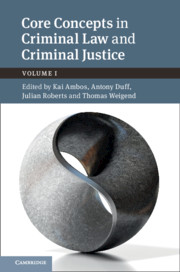Book contents
- Core Concepts in Criminal Law and Criminal Justice
- Core Concepts in Criminal Law and Criminal Justice
- Copyright page
- Contents
- Preface
- Abbreviations
- Contributors
- Part I Introduction
- Part II Criminal Law
- Part III Criminal Justice and Procedure
- 7 Proportionality of Punishment in Common Law Jurisdictions and in Germany
- 8 Criminal History Enhancements at Sentencing
- 9 Due Process
- 10 The Role of the Prosecutor
- 11 Negotiated Case Dispositions in Germany, England and the United States
- 12 Exclusion or Non-Use of Illegally Gathered Evidence in the Criminal Process: Focus on Common Law and German Approaches
- Index
- References
9 - Due Process
from Part III - Criminal Justice and Procedure
Published online by Cambridge University Press: 19 December 2019
- Core Concepts in Criminal Law and Criminal Justice
- Core Concepts in Criminal Law and Criminal Justice
- Copyright page
- Contents
- Preface
- Abbreviations
- Contributors
- Part I Introduction
- Part II Criminal Law
- Part III Criminal Justice and Procedure
- 7 Proportionality of Punishment in Common Law Jurisdictions and in Germany
- 8 Criminal History Enhancements at Sentencing
- 9 Due Process
- 10 The Role of the Prosecutor
- 11 Negotiated Case Dispositions in Germany, England and the United States
- 12 Exclusion or Non-Use of Illegally Gathered Evidence in the Criminal Process: Focus on Common Law and German Approaches
- Index
- References
Summary
‘Due process’ is a central concept in Anglo-American criminal justice that safeguards the rights of those subject to the criminal process and guides state officials, vital to the authority of the criminal law and the legitimacy of the legal system. Comparison reveals what is distinctive about Anglo-American and German conceptions of due process, and how far their development is the product of their legal history and local legal culture. As Galligan observes of dispute over ‘whether the adversarial nature of the trial at common law is to be preferred to the more inquisitorial procedures of continental Europe … the real debate in comparing the two approaches is not about which will lead to more correct outcomes, but rather what values are relevant’. Comparative analysis permits a better understanding of what is distinctive in the respective systems. It reveals what commonalities exist and to what extent international developments, not least the important jurisprudence on the right to a fair trial under Article 6 of the European Convention on Human Rights (ECHR), foster convergence among signatory states.
- Type
- Chapter
- Information
- Core Concepts in Criminal Law and Criminal Justice , pp. 304 - 342Publisher: Cambridge University PressPrint publication year: 2020

